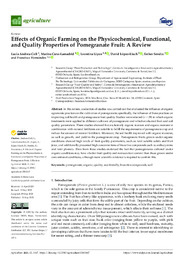Please use this identifier to cite or link to this item:
https://hdl.handle.net/11000/32396Full metadata record
| DC Field | Value | Language |
|---|---|---|
| dc.contributor.author | Andreu Coll, Lucía | - |
| dc.contributor.author | Cano-Lamadrid, Marina | - |
| dc.contributor.author | Lipan, Leontina | - |
| dc.contributor.author | López Lluch, David | - |
| dc.contributor.author | Sendra, Esther | - |
| dc.contributor.author | Hernández, Francisca | - |
| dc.contributor.other | Departamentos de la UMH::Producción Vegetal y Microbiología | es_ES |
| dc.date.accessioned | 2024-07-01T11:51:01Z | - |
| dc.date.available | 2024-07-01T11:51:01Z | - |
| dc.date.created | 2023-05-31 | - |
| dc.identifier.citation | Agriculture 2023, 13(6), 1167 | es_ES |
| dc.identifier.issn | 2077-0472 | - |
| dc.identifier.uri | https://hdl.handle.net/11000/32396 | - |
| dc.description.abstract | In this review, a selection of studies was carried out that evaluated the influence of organic agronomic practices on the cultivation of pomegranate; specifically, the influence of these practices on improving soil health and pomegranate fruit quality. Studies were selected (n = 39) in which organic treatments were applied to different cultivars of pomegranate and which evaluated fruit and soil quality parameters. These studies showed that exclusively organic manure and organic manure in combination with mineral fertilizers are suitable to fulfill the requirements of pomegranate crop and reduce the amount of mineral fertilizers. Moreover, the soil health improved with organic manures, as well as growth, and yield in the pomegranate crop. Pomegranate fruits grown under organic conditions showed high levels of fruit quality parameters, such as total soluble solids and fruit juice, and additionally presented high concentrations of bioactive compounds such as anthocyanins and total phenols. Data from these studies endorsed the fact that pomegranates cultured under organic conditions may have a better fruit quality and nutraceutical content than those grown under conventional conditions, although more scientific evidence is required to confirm this | es_ES |
| dc.format | application/pdf | es_ES |
| dc.format.extent | 13 | es_ES |
| dc.language.iso | eng | es_ES |
| dc.publisher | MDPI | es_ES |
| dc.rights | info:eu-repo/semantics/openAccess | es_ES |
| dc.rights.uri | http://creativecommons.org/licenses/by-nc-nd/4.0/ | * |
| dc.subject | Pomegranate | es_ES |
| dc.subject | Organic | es_ES |
| dc.subject | Quality | es_ES |
| dc.subject | Eco-friendly | es_ES |
| dc.subject | Bioactive compounds | es_ES |
| dc.subject | Soil | es_ES |
| dc.subject.other | CDU::6 - Ciencias aplicadas::63 - Agricultura. Silvicultura. Zootecnia. Caza. Pesca | es_ES |
| dc.title | Effects of Organic Farming on the Physicochemical, Functional, and Quality Properties of Pomegranate Fruit: A Review | es_ES |
| dc.type | info:eu-repo/semantics/article | es_ES |
| dc.relation.publisherversion | https://doi.org/10.3390/agriculture13061167 | es_ES |

View/Open:
Effects of Organic Farming on the Physicochemical, Functional, and Quality Properties of Pomegranate Fruit.pdf
577,12 kB
Adobe PDF
Share:
.png)
